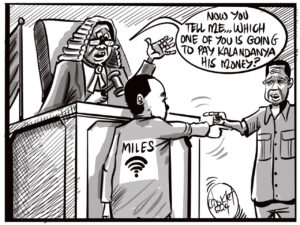NAREP president Elias Chipimo says there is no rule that prohibits citizens from criticising a judgement of a court case which has been disposed off.
In an interview with News Diggers! Chipimo who is a distinguished Lusaka based lawyer, said a court which has been attacked, however, has a mandated to make a decision and cite an offender for contempt.
He stressed that expressing ones opinion on a matter could only be regarded as contempt if the said case was still actively before a judge or if the offender maliciously attacked the personality of a judge.
“One hundred percent, there is no rule which says ‘you cannot criticise a judgement’ but the key is don’t insult the judge in the process of criticising because then you are undermining the authority of the court as opposed to questioning whether the basis on which they made the judgment was the right basis. Now the moment when you start to go beyond, unless you have proof, because remember it is okay for me to say you are a thief if I can prove that you are thief and the courts are not different. So I should still be free if I believe that the judge was given something in order to make a decision and I can prove it, then nothing prevents me from being brave and saying ‘this is what has happened’ because when I come up for contempt, I can actually show that actually the reason why I said that was because of these reasons and this is the proof. [in this case, there is a separation of the judgement itself] and the individual who has made that judgement,” Chipimo said.
“Contempt of court is a very tricky issue because when you look at the reason why the offence is there, it will help you to understand that sometimes the rule of natural justice as we know them, may not always be applicable when it comes to issues of contempt of court. So originally, the way contempt of court worked was because somebody threw something at the judge and so the authority of the court was immediately undermined. So the judge had to make a decision right on the spot and punish that individual using the authority of the court and of course of the law. So there are certain things that stand out immediately [i.e] the idea is that you don’t want the court to be put on the state where it’s ridiculed or made to look useless or made to look like it cannot be taken seriously.”
Chipimo said that in an event that a judge was insulted, it was the same judge who is expected to take action against the individual offender.
“So contempt of court is to protect the authority of the court system, and if you insult a judge then it’s like there is no authority of that judge or the court system. And when there is no authority of the court system, then law and order breaks down because that is the only thing which is keeping you and me from fighting each other and doing whatever we want to do. So the idea is to protect the integrity and authority of the court. Now from the example you can see that the judge himself who has been insulted is the one who actually takes the action against the individual who has committed that contempt, even without being compelled because that’s direct contempt,” he said.
“Now when it happens outside the court , it is slightly a different issue. Then usually what happens is that somebody should move the court and say ‘look, this is what has been said’ because the judge was not there to see it himself, somebody could be making up the story and say this is what this person said, she said that ‘this is a judgement of an idiot.’ Now if I wasn’t there as a judge to hear you say that, even if I read it somewhere, I don’t know if is really what you said because the journalist may not have written it correctly, may have thrown in their own issues, there are so many different things. And that is why usually you need somebody else to say ‘let us take this matter forward so that the court can hear for themselves and make a decision. In that case it will be the very court that is being attacked which would be the one to make a decision.”
He said there was nothing contemptuous about condemning a judgement that has been delivered at the end of trial.
“Contempt is never about a judgement. Contempt can be about a matter that is still in court but not about a judgement. I can say that is was a bad judgement and it didn’t take into account the following things but the moment I start to talk about the judge himself and to ridicule the judge, then I am undermining the authority of the court. Unless I have clear proof to back-up the reason why I am saying the things I am saying about that particular judge,” explained Chipimo.












